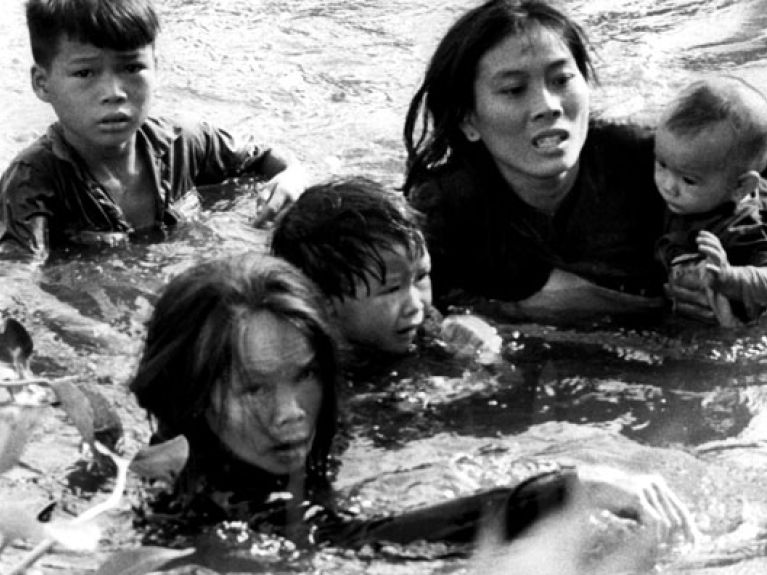The “boat people” and their children
Nearly 40 years ago, the Vietnamese were the first non-European refugees to arrive in Germany. Today, the “boat people” and their children have integrated well into German society. How was this achieved?

The sea appeared to be their last resort. Around a million and a half people climbed aboard boats, many of them little more than wrecks, and set off from their homeland of Vietnam without knowing exactly where they would end up. Driven away by war and persecution, they came to be known as “boat people”. Nobody knows just how many of them did not survive the journey. Beginning in 1978, this exodus was the second wave, hundreds of thousands having already fled the country– either by land or together with the departing US troops – after South Vietnam surrendered in 1975. So now they were coming by water, all hoping for a future in a far-away land. The conditions on board were often appalling. Images of emaciated survivors and overcrowded reception camps were seen around the world.
Millions of television viewers were moved by the pictures, sparking a wave of support in Germany. Ernst Albrecht, the Lower Saxony state premier and father of the current defence minister Ursula von der Leyen, was the first in 1978 to decide to take Vietnamese refugees in his federal state. A short time later, the journalist Rupert Neudeck founded a private aid committee named “Ein Schiff für Vietnam” (i.e. A ship for Vietnam), chartered the cargo ship “Cap Anamur”, converted it using donated funds, and sent it off to Vietnam. Over 10,000 Vietnamese came to Germany by this route alone. They were the first refugees to migrate to Germany from outside Europe.
A great deal of compassion was shown to these people, explains Jochen Oltmer, a historian at Osnabrück University. The German public was very willing to help, and the way the story had been reported in the media had a lot to do with this. Today, nearly four decades later, those who had found themselves uprooted at the time have now integrated well into German society. It is estimated that there are up to 50,000 of them. “It was all documented to only a limited extent”, stresses Oltmer. “We have extremely little research about the boat people in Germany.”
Despite the gaps in the data, Germans of Vietnamese descent have long been regarded as a prime example of successful integration. Many of them have attained economic success and prosperity, their children often becoming doctors, engineers or scientists. So how was their integration achieved? “They recognised very quickly that they can only make something of their lives here through education”, says Jochen Oltmer. The opportunities offered by the German school system were – and continue to be – gratefully accepted. However, Oltmer believes that one key factor was also the attitude of German society, people’s open-heartedness proving a strong motivation for the Vietnamese refugees. As such, this group’s focus on education was to a major extent the result of a proactive attitude towards integration. Or to put it another way: people who feel welcome are keen to settle quickly into society. This serves as an incentive.
Olaf Beuchling takes a different view. An educationalist who teaches at Otto von Guericke University Magdeburg, he has already spent more than 15 years researching the social integration of former Vietnamese refugees. He believes that the key element in their success is the mentality of the newcomers themselves. “They have a very important foundation in terms of their cultural history”, says Beuchling, explaining that Vietnam belongs to what is known as the meta-Confucian cultural area. Under Chinese rule, which lasted more than 1,000 years, Confucianism became the state doctrine. This set of beliefs emphasises harmony in worldly matters, as Beuchling elucidates. “This also resulted in a pre-modern education system being set up in these countries.” It was open to all male citizens and allowed anyone, irrespective of their background, to qualify for and make a career in the civil service through training and personal achievement.
The legacy of Confucianism still leaves its mark to this day, says Olaf Beuchling. “Learning is regarded as a virtue in these cultures.” Beuchling believes that the Vietnamese refugees brought this attitude with them to their adopted countries. In families, the children’s education is the uppermost priority, and a great deal of time and money is invested, among other things in private tuition. As far as marks are concerned, there is often considerable competition within Vietnamese communities. People even publish their school reports on special websites so that everyone can see them. As Beuchling explains, the success of the children also elevates the status of their parents. “That is a typical characteristic of collectivist cultures.”
International Migrants Day on 18 December 2016
© www.deutschland.de

